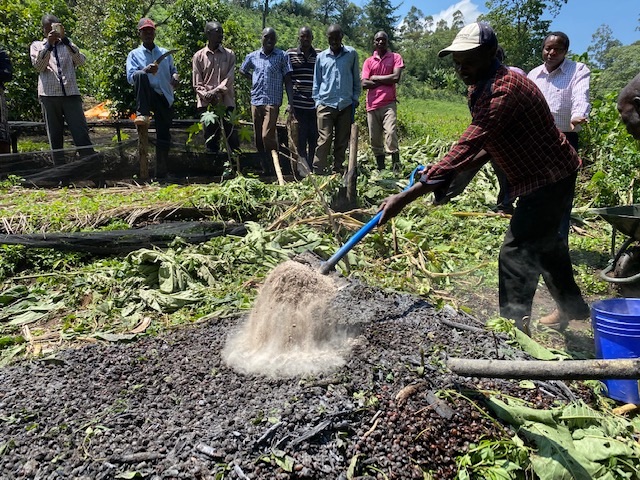A section of coffee farmers during one of the TRACE Kenya project vermicomposting training sessions at Kichawir Farmers Cooperative Society in Kenya, October 2020.
The shift toward sustainable food consumption patterns and preferences is attributed to the health and environmental risks associated with some harmful farming practices in conventional agriculture, including use of synthetic fertilizers or harmful pesticides. To meet this growing demand for sustainable products and services, more retailers are sourcing organic produce.
Within the specialty coffee market in Europe, organic certification is gaining popularity and this is expected to boost the import volumes for certified coffee. European retailers and supermarkets offer a growing assortment of organic product brands, including coffee. In addition, governments are also playing an important role in promoting consumption of organic products through their public procurement policies.
Within the Kenyan coffee sector, the trend towards organic and sustainable practices is a strategic move that allows more local farmers to access the competitive high value markets while contributing to reduction of the associated health risks and negative environmental impacts and promoting sustainable use of the earth’s resources.
In addition to the health-related complications, use of synthetic fertilizers or harmful pesticides is linked to various longer-term side-effects including soil erosion and decline in soil fertility. Organic coffee therefore, reduces consumers’ exposure to synthetic chemicals and pesticides. Furthermore, socially empathetic consumers buy organic coffee to reduce farm workers’ exposure to toxins.
Organic Coffee Farming Certification in Kenya — Understanding the Gaps
Although the benefits are extensive, many coffee farmers in Kenya do not pursue organic certification. This includes farmers who have already adopted organic farming practices.
So, what is the missing link between organic farming and organic certification for Kenyan coffee farmers?
Cost of Organic Certification
The costs of organic certification range from 1,600-3,000 Euros, depending on the size of farm operations, number of farmers and the third-party certifying agent. These costs encompass a one-time application fee, as well as annual inspection and assessment/audit costs.
Conversion/Transition Period: Non-Organic to Organic Farming
Prior to certification, local coffee farmers have to successfully complete a three-year conversion during which organic farming practices must be fully adopted. These practices include avoiding all synthetic chemicals and other banned substances, as well changing production methods. During this period, coffee produce cannot be sold in the organic markets meaning that farmers cannot profit from the benefits of organic certification labels. Therefore the upfront costs can be prohibitive and the delayed economic gains may also deter most small-holder farmers from pursuing organic certification. Furthermore, for many small-holder farmers in Kenya, the opportunity cost of the mandatory three-year conversion period by far outweighs the benefits of the premium safe food the market desires.
Most small-holder coffee farmers in the Western part of Kenya practice organic coffee farming by default. Coffee is produced without application of any artificial chemicals and pesticides mainly because the farmers are resource-poor and therefore unable to afford or access synthetic chemicals. This case provides a major opportunity because organic certification can be easily realized after one conversion year.
Towards Organic Coffee Certification in Kenya
Launched in September 2020, the Traceable Organic Coffee from Kenya (‘TRACE Kenya’) project aims to bridge the existing gaps towards organic certification. The three and a half year project targets 15,000 small-holder farmers in Bungoma, Kericho and Nandi counties. TRACE Kenya project will be implemented using a multi-pronged approach aimed at building the capacity of coffee farmers to enable them produce coffee that matches the consumers’ and the global organic market standards.
The TRACE Kenya project is funded by the Ministry of Foreign Affairs of Denmark (DANIDA) and implemented by Solidaridad East and Central Africa in partnership with African Coffee Roasters (ACR) and Solidaridad Europe. The project is working closely with the Kenya Agricultural & Livestock Research Organisation’s – Coffee Research Institute (CRI) and the County Governments of Kericho, Nandi and Bungoma to tap into their already existing experiences and for sustainability purposes post-2023. The Kenya Coffee Research Institute (CRI) will sensitize and train the farmers on innovative organic coffee farming practices to facilitate them successfully transition from the conventional production system.
In addition, TRACE Kenya will support coffee cooperatives in Kenya to foster adoption of the requisite internal control systems towards organic certification. Certification of both farmers and cooperatives is envisioned to open up vast market opportunities in Europe and the United States of America. In addition to ensuring that farmers benefit from competitive prices for their produce, the TRACE Kenya project will also contribute to environmental protection and climate change mitigation through the promotion of farming techniques that ensure sustainable utilization of the earth’s resources The project will also contribute to reduction of health risks linked to use of chemicals and pesticides for farm workers as well as the larger farming communities and consumers.
Read more about our work in Coffee.

